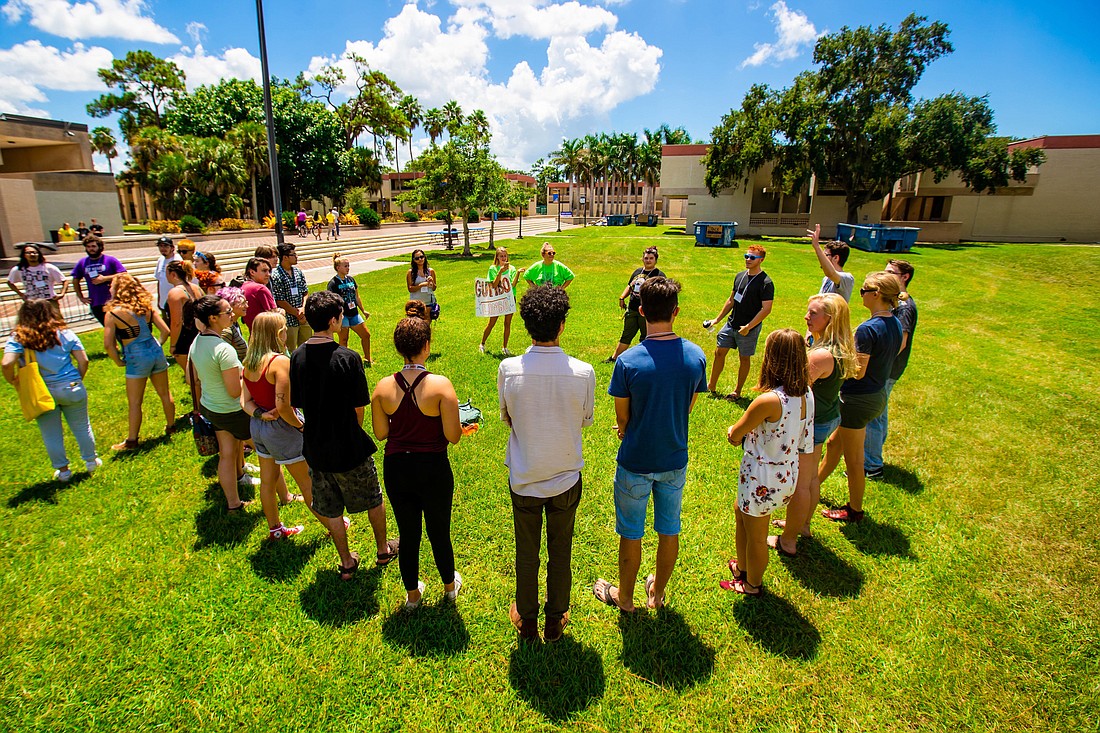- November 30, 2024
-
-
Loading

Loading

Most colleges would scoff at the idea of leadership as a major.
The seemingly understandable reasons for that are twofold. For one, leadership can be an abstract concept and not as concrete as say, math, or analyzing English literature. The second reason, of course, is leadership, at least in conventional wisdom, comes from experienced and learned people — not teens who can’t even legally buy a beer.
But several colleges in the region have recently begun to address leadership in a more tangible way. It’s a sign colleges are recognizing, to some extent, that preparing students to enter the workforce requires a baseline of being able to lead people, projects and many times both. USF, for example, through its Muma College of Business, recently offered a 14-hour virtual class to earn a Diversity, Equity and Inclusion in the Workplace Certificate. The curriculum included several courses on how someone, at nearly any level, can lead that kind of change in a workplace. The University of Tampa, meanwhile, through its Learn and Lead Series, is offering a six-week course called Leading in a Post Covid-19 World — Certificate in Resilient Leadership.
Those classes offer concrete and tangible leadership lessons. (I’m currently enrolled in the resilient leadership course at UT.) New College of Florida, the state’s liberal arts honors college, is taking its leadership focus one step further, I think, with its Certificate in Leadership program.
When I first read about it, I thought New College, based in Sarasota, was an odd fit for a leadership certificate. The school is known locally more for its no-grading policy — it uses narrative evaluations — and its socially-conscious, left-leaning student body than producing reams of business leaders. (Not to say New College doesn’t have a boast-worthy roster of wildly successful business-focused alumni. It does, with a list that includes former President of the Federal Reserve Bank of New York William Dudley; nationally-known time management consultant and author David Allen; Hollywood producer Carol Flint; and many more.)
But the certificate program, I believe, is a solid way to engage students on some leadership concepts that will be valuable for them wherever they work and in whatever career they pursue. I recently spoke with the head of the school’s career education department, Dwayne Peterson, and the certificate’s head instructor and coordinator, Patricia Courtois, about the program. Courtois is a recently-retired marketing, branding and ad executive.
“We know New College students are interested in big changes and making a difference. But many of our students need some help in creating a signal to the market about what they can do. Liberal arts students sometimes have a hard time showing that,” says Peterson. “This shows them how to do it in the business world.”
One of the core themes? That leadership isn’t about age or title — but more about fostering creative problem solving while also inspiring others around you to achieve great things. “We’ve all been in places where you’ve made some missteps, but we are hoping to bridge that gap with some important leadership skills,” Courtois tells me. “Students need to know that no matter who you are or where are you go, they can facilitate change.”
A New College Professional in Residence, Courtois is a great choice to help coordinate the curriculum — delivering real-world experience in the academic setting. For one, she herself is a liberal arts major, a Northwestern University alum who initially thought she would be a journalist, with a major in English literature and journalism. She instead got into advertising and public relations, working first for brands such as Tropicana, Sweet’N Low and Sara Lee. She later helped grow a Sarasota agency that worked with prominent local clients, in everything from condo projects to the Sarasota Orchestra.
I’ve known Courtois for more than a decade. Beyond her résumé she brings a measured, big-picture focus to her work, something students in the program could learn from in our fast-pace, smart-phone driven world. And Courtois has another important leadership trait she’s utilizing in her work at New College: vulnerability. She talks often about having the wherewithal to fail forward, and to recognize your strengths and weaknesses. “I’m not a professor…so talking to students can be a little nerve-racking,” she says “But I’m so energized doing this. It’s fun for me to think about impacting students in such a direct way.”
The first New College Certificate in Leadership program was held last spring over Zoom, in five 90-minute sessions. Courses included Collaboration through Teamwork, Creativity Works Everywhere, Matching Your talent with the Business Setting and Leadership Exists at Any Level. Instructors included Art Lambert, co-founder of Sarasota-based S-One Holdings; New College alum and retired Coach executive Felice Schulaner; and New College alum Jeff Lundy who oversees public policy at PepsiCo.
The second run of the non-credit program will take place in the fall, with a few tweaks to the curriculum. That includes courses addressing how to work through conflict and debate with others and how to lead groups of people from backgrounds, says Peterson, New College students might not have worked with before. “Leadership is what employers are looking for,” says Peterson, and “no one really teach students how to do these things.”
That list includes pushing yourself to do things you didn’t think you could do before — building a confidence you can successfully lead others. Courtois says that involves teaching students, with real-life examples, that “it’s OK to step into a role and say ‘I’ll do that.’”